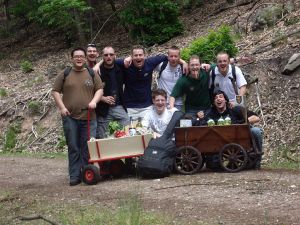Father's Day
| Father's Day | |
|---|---|
| Observed by | Many countries |
| Type | Historical |
| Date | Varies regionally |
| Related to | Mother's Day |
Father's Day is a celebration inaugurated in the early twentieth century to complement Mother's Day in celebrating fatherhood and male parenting, and to honor and commemorate fathers and forefathers. Father's Day is celebrated on a variety of dates worldwide and typically involves gift-giving, and special dinners to fathers and family-oriented activities. In 2008, it was celebrated on June 15 in many countries. It originated in Spokane, Washington.[citation needed] In 2009, it will be celebrated on June 21 in many countries.
Although Mrs. John B. Dodd of Washington was the first to solicit the idea of having a Father's Day observance (while listening to a Mother's Day sermon in church), the very first Father's Day observance didn't transpire for many years. That first observance was held in a church in Fairmont, West Virginia. "Dr. Robert Webb of West Virginia is believed to have conducted the first Father's Day service on July 5, 1908 at the Central Church of Fairmont." [1]
Spelling
Although normal English punctuation guidelines indicate that the holiday should be spelled "Fathers' Day" (as it is a plural possessive), common usage dictates that the ostensibly singular possessive "Father's Day" is the preferred spelling.
Dates
The officially recognized date of Father's Day varies from country to country. This section lists some significant examples, in order of date of observance.
International history and traditions
Argentina
Father's Day on Argentina is celebrated on the third Sunday of June, but there have been several attempts to change it to August 24 to honor the day when the "Father of the Nation" José de San Martín became a father. [2]
On 1953 it was proposed to the General Direction of Schools of Mendoza Province the celebration on all educational stablishments of a Father's Day on August 24 in honor of José de San Martín, and it was celebrated for the first time on 1958, but it was not included on the scholar calendar due to the pression of several groups, and it started being celebrated on the third Sunday of June. [3]
The schools on the Mendoza Province kept celebrating Father's Day on August 24, and, on 1982, the Provincial Governor passed a law declaring Father's Day on the province to be celebrated on August 24. [3]
On 2004, several proposals to change the date to August 24 were presented to the argentinian Camara de Diputados on a single unified project. [3] It was approved, and it was passed to the Senate of Argentina for final review and approval. The Senate changed the proposed new date to the third Sunday of August, and scheduled the project for approval. However, the project was never treated on the Senate on the planned session, which caused its failure. [4]
Costa Rica
In Costa Rica the Unidad Social Cristiana party presented a bill to change the celebration of the day from the third Sunday of June to 19th March, the day of Saint Joseph.[5] That was in order to give tribute to this saint, who gave name to the capital of the country San José, Costa Rica, and so family heads wuill be able to celebrate the Father's Day at the same time as the Feast of Saint Joseph the Worker.[6] The official date is still third Sunday of June.
Germany
In Germany there is no such thing as Father's Day [7][8] as celebrated throughout the western world. There are two terms and/or events of an older origin that while similar in name, have entirely different meanings. Vatertag, is always celebrated on Ascension Day (the Thursday forty days after Easter), which is a federal holiday. Regionally, it is also called men's day, Männertag, or gentlemen's day, Herrentag. It is tradition to do a males-only hiking tour with one or more smaller wagons, Bollerwagen, pulled by manpower. In the wagons are wine or beer (according to region) and traditional regional food, Hausmannskost, which could be Saumagen, Liverwurst, Blutwurst (Blood Sausage), vegetables, eggs, etc.
Some parts of Germany (such as Bavaria and the northern part of Germany) call this particular day "Vatertag," which is the literal equivalent to Father's Day.
Roman Catholic tradition
In the Roman Catholic tradition, Fathers are celebrated on Saint Joseph's Day, commonly called Feast of Saint Joseph, March 19, though in most countries Father's Day is a secular celebration. [9]
Taiwan
In Taiwan, Father's Day is not an official holiday, but is widely observed on August 8, the eighth day of the eighth month of the year. In Mandarin Chinese, the pronunciation of the number 8 is bā. This pronunciation is very similar to the character "爸" "bà," which means "Papa" or "father." The Taiwanese, therefore, usually call August 8 by its nickname, "Bābā Day" (爸爸節).
Thailand
In Thailand, Father's Day is set as the birthday of the king. December 5 is the birthday of current king, Bhumibol Adulyadej (Rama IX).The celebration is using the flower of Father's day Canna (Dok put ta ruk sa) to give to our father or grandfather or your parents that he should be man.For Thai king, Thai people will wearing a yellow cloth for Bhumibol Adulyadej because yellow is the king was born Monday.
Notes
- ↑ Father's Day History
- ↑ "Argentina, el origen del Día del Padre, ayer Google en español lo tuvo en su Portal", 2008-06-16. Retrieved 2008-07-12.
- ↑ 3.0 3.1 3.2 Sesiones ordinarias 2004 Orden del día nº1798: Día del Padre. Institúyese como tal el día 24 de agosto de cada año.. Cámara de Diputados de la Nación (2008-11-07). Retrieved 2008-06-07.
- ↑ Día del Padre (Estado del trámite del proyecto de ley). Retrieved 2008-07-12.
- ↑ Rodolfo Delgado Valverde. Proyecto de Ley. Celebración del 19 de Marzo como Día del Padre. Expediente 15911..
- ↑ Presentan en Costa Rica proyecto de ley para celebrar día del padre el día de San José. ACI Prensa (2005-05-26).
- ↑ "Father's Day and Vatertag", About.com.
- ↑ "Don't get drunk on Father's Day, German minister urges", yahoo.com.
- ↑ Kerry Tilby (June 2007). Fathers Day. Kiwi Families. Retrieved 2008-05-23.
ReferencesISBN links support NWE through referral fees
External links
| |||||||
Credits
New World Encyclopedia writers and editors rewrote and completed the Wikipedia article in accordance with New World Encyclopedia standards. This article abides by terms of the Creative Commons CC-by-sa 3.0 License (CC-by-sa), which may be used and disseminated with proper attribution. Credit is due under the terms of this license that can reference both the New World Encyclopedia contributors and the selfless volunteer contributors of the Wikimedia Foundation. To cite this article click here for a list of acceptable citing formats.The history of earlier contributions by wikipedians is accessible to researchers here:
The history of this article since it was imported to New World Encyclopedia:
Note: Some restrictions may apply to use of individual images which are separately licensed.

